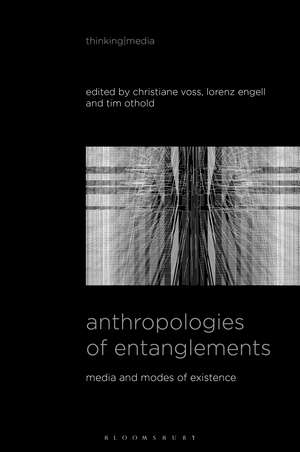Anthropologies of Entanglements: Media and Modes of Existence: Thinking Media
Editat de Christiane Voss, Lorenz Engell, Tim Otholden Limba Engleză Hardback – 20 sep 2023
Din seria Thinking Media
- 23%
 Preț: 198.93 lei
Preț: 198.93 lei - 23%
 Preț: 193.62 lei
Preț: 193.62 lei - 30%
 Preț: 538.77 lei
Preț: 538.77 lei - 22%
 Preț: 258.33 lei
Preț: 258.33 lei - 13%
 Preț: 257.76 lei
Preț: 257.76 lei - 22%
 Preț: 239.59 lei
Preț: 239.59 lei - 14%
 Preț: 183.70 lei
Preț: 183.70 lei -
![Eigenvalue: On the Gradual Contraction of Media in Movement; Contemplating Media in Art [Sound Image Sense]](https://i2.books-express.ro/bs/9781501363177/eigenvalue.jpg) Preț: 222.84 lei
Preț: 222.84 lei - 22%
 Preț: 226.97 lei
Preț: 226.97 lei - 21%
 Preț: 215.88 lei
Preț: 215.88 lei - 24%
 Preț: 196.08 lei
Preț: 196.08 lei - 24%
 Preț: 196.36 lei
Preț: 196.36 lei - 24%
 Preț: 195.03 lei
Preț: 195.03 lei - 23%
 Preț: 199.91 lei
Preț: 199.91 lei - 24%
 Preț: 189.87 lei
Preț: 189.87 lei - 23%
 Preț: 192.55 lei
Preț: 192.55 lei - 23%
 Preț: 191.67 lei
Preț: 191.67 lei - 23%
 Preț: 193.87 lei
Preț: 193.87 lei - 30%
 Preț: 537.37 lei
Preț: 537.37 lei
Preț: 537.78 lei
Preț vechi: 772.49 lei
-30% Nou
Puncte Express: 807
Preț estimativ în valută:
102.91€ • 106.16$ • 85.87£
102.91€ • 106.16$ • 85.87£
Carte disponibilă
Livrare economică 05-19 martie
Preluare comenzi: 021 569.72.76
Specificații
ISBN-13: 9781501375149
ISBN-10: 1501375148
Pagini: 328
Ilustrații: 57 colour images
Dimensiuni: 140 x 216 mm
Greutate: 0.4 kg
Editura: Bloomsbury Publishing
Colecția Bloomsbury Academic
Seria Thinking Media
Locul publicării:New York, United States
ISBN-10: 1501375148
Pagini: 328
Ilustrații: 57 colour images
Dimensiuni: 140 x 216 mm
Greutate: 0.4 kg
Editura: Bloomsbury Publishing
Colecția Bloomsbury Academic
Seria Thinking Media
Locul publicării:New York, United States
Caracteristici
Initiates a dialogue between innovative approaches from media-philosophical reflection, empirical field research and analysis, and various other backgrounds, highlighting their productive relationships
Notă biografică
Christiane Voss is Professor of Philosophy of Audiovisual Media at the Bauhaus-University Weimar, Germany. Important publications include Die Relevanz der Irrelevanz (2021), together with Lorenz Engell, Der Leihkörper (2013), and Narrative Emotions (2003). Lorenz Engell is Professor of Media Philosophy at Bauhaus-Universität Weimar, Germany, where he was the founding dean of the Faculty of Media from 1996-2000 and co-director of the International Research Center for Cultural Techniques and Media Philosophy (IKKM) from 2008-2020. Tim Othold is a research associate and coordinator at the DFG post-graduate program for "Media Anthropology" at the Bauhaus-University Weimar, Germany. He has published on media philosophical approaches to digital culture, the internet of things, games, and the concept of remnants and remainders.
Cuprins
Acknowledgements Anthropologies of Entanglements: An Introduction Christiane Voss, Lorenz Engell, Tim Othold (Bauhaus-University Weimar, Germany) I. Milieus1. Existing in Motion: Foundations for a Philosophical Media-Anthropology Christiane Voss (Bauhaus-University Weimar, Germany)2. Tangled Efforts and Middle-Voiced Verbs Jane Bennett (Johns Hopkins University, USA)3. The Experience-Image and Collaborative Filmmaking - From Visual Anthropology to Media-Anthropological Practices Julia Bee (University of Siegen, Germany)4. A Life in the Interstices: Micropolitics and Aesthetics in Everyday Life Christoph Carsten (Independent Scholar, Germany) II. Practice and Process5. Prosthesis for Feeling: Intensifying Potentiality through MediaMark B.N. Hansen (Duke University, USA)6. Chemæra Jason Pine (Independent Scholar, USA)7. In Control of Algorithms: Video Analytics and Human-machine Relations at the Train Station Gabriele Schabacher (Johannes Gutenberg University Mainz, Germany)8. On the Anthropology of the mode double click Lorenz Engell (Bauhaus-Universität Weimar, Germany)9. Neutral Time Philip Gries (Bauhaus-University Weimar, Germany) III. Bodies in Media10. Unfolding Bodies. Art and Ontology of the American Northwest Coast Bernhard Siegert (Bauhaus-University Weimar, Germany)11. Corporeal Literacy: Alphabetic Bodies and the Logic of the CutMaaike Bleeker (Utrecht University, the Netherlands)12.Torn, Crushed, Shredded. The Reconstruction of Wounded Bodies in World War I Johanna Seifert (FernUniversität, Germany)13. Material Dialectics of the Hard BodyIvo Ritzer (University of Bayreuth, Germany)14. She is Inseminating: On the Secret of Life in Claire Denis's Science Fiction Film High Life (2018)Astrid Deuber-Mankowsky (Ruhr-University Bochum, Germany) ContributorsIndex
Recenzii
Anthropologies of Entanglement develops a new and inspiring approach to understanding our contemporary condition of the "Mediocene", in which the human and natural spheres are indissolubly intertwined with and permeated by media. Its key word, "Anthropomediality," convincingly suggests to conceive the human existence as mediatic; the relation comes before the related. The 16 contributions by international authors from a broad variety of fields brilliantly discuss the entanglements that precede all forms of reification and anthropogenesis.
This splendid collection includes essays tackling examples from the multiple histories of our co-evolution with technologies (from the prostheses of World War I to today's surveillance devices of the train station) and others offering ways to conceptualize the status of human-media interrelations, and their inseparability, that entanglement carried in Voss' term, "anthropomediality." The writing is consistently lucid and engaging, as well as helpful in unfolding dense theories into usable form and in applying them to a diversity of films (from Rocky to Claire Denis). The book will be particularly valuable for students wanting to think more deeply about the consequences of a traffic that courses among media and existence.
This splendid collection includes essays tackling examples from the multiple histories of our co-evolution with technologies (from the prostheses of World War I to today's surveillance devices of the train station) and others offering ways to conceptualize the status of human-media interrelations, and their inseparability, that entanglement carried in Voss' term, "anthropomediality." The writing is consistently lucid and engaging, as well as helpful in unfolding dense theories into usable form and in applying them to a diversity of films (from Rocky to Claire Denis). The book will be particularly valuable for students wanting to think more deeply about the consequences of a traffic that courses among media and existence.
